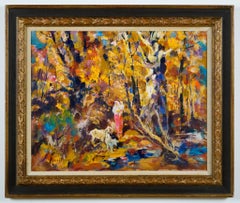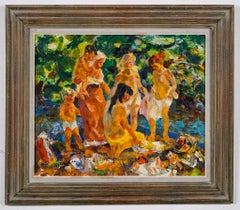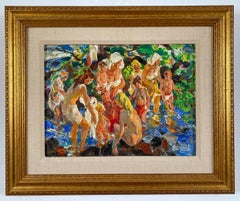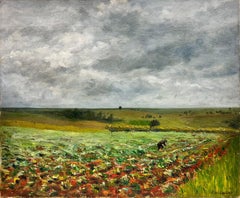John Edward Costigan Figurative Paintings
American, 1888-1972
An American Painter Compositional painter of figures and country animals; watercolor painter Costigan was a largely self-taught artist. He moved from Providence, Rhode Island to New York City as an orphaned teenager in 1904 to work for a commercial poster company. It was here that he learned the rudiments of drawing and painting, skills he furthered with informal study at New York's Kit Kat Club, a popular artists' hangout. Costigan achieved national fame as a painter and printmaker in the1920s and 30s. He won numerous prestigious awards and, despite his lack of formal artistic training, was elected a full member of the National Academy of Design. In 1937 the Smithsonian Institution held a one-person exhibition of his graphic works. Famed American printmaker John Taylor Arms praised Costigan as "a brilliant etcher, particularly noted for his interpretation of life on the American farmstead." Today prints by Costigan can be found in private and public collections around the nation, including the Prints and Photographs Division of the Library of Congress in Washington, which owns twenty-two. The Swope exhibition is the largest devoted to Costigan's work since the late 1960s. Many of the forty-five prints in the exhibition are from the Swope's own extensive holdings of Costigan's works. Other are being lent by private collectors from around the country.to
1
1
1
Overall Width
to
Overall Height
to
3
1
2
3
3
3
2
2
2
3
3
10
465
321
255
229
3
3
Artist: John Edward Costigan
Woman and Child
By John Edward Costigan
Located in Sheffield, MA
John Edward Costigan, N.A.
American, 1888-1972
Woman and Child
Oil on canvas
Signed ‘J.E. Costigan N.A.’ lower left
24 by 30 in. W/frame 32 by 38 in.
John Costigan was born of Irish-American parents in Providence, Rhode Island, February 29, 1888. He was a cousin of the noted American showman, George M. Cohan, whose parents brought the young Costigan to New York City and was instrumental in starting him on a career in the visual arts. They were less successful in encouraging him to pursue formal studies at the Art Students League (where, however, he later taught) than in exposing him to the commercial art world through the job they had gotten him with the New York lithographing firm that made their theatrical posters.
At the H. C. Miner Lithographing Company, Costigan worked his way up from his entry job as a pressroom helper, through various apprenticeships, to the position of sketch artist. In the latter capacity he was an uncredited designer of posters for the Ziegfeld Follies and for numerous silent films. Meanwhile, he had supplemented his very meager formal studies in the fine arts with a self-teaching discipline that led to his first professional recognition in 1920 with the receipt of prizes for an oil painting and watercolor in separate New York exhibitions.
A year earlier, Costigan had wed professional model Ida Blessin, with whom he established residence and began raising a family in the sleepy little rural New York hamlet of Orangeburg, the setting for the many idyllic farm landscapes and wood interiors with which he was to become identified in a career that would span half a century.
John Costigan’s first national recognition came in 1922 with his winning of the coveted Peterson Purchase prize of the Art Institute of Chicago for an oil on canvas, “Sheep at the Brook.” It marked the start of an unbroken winning streak that would gain him at least one important prize per year for the remainder of the decade. The nation’s art journalists and critics began to take notice, making him the recurring subject of newspaper features and magazine articles. The eminent author and critic Edgar Holger Cahill was just a fledgling reporter when he wrote his first feature, “John Costigan Carries the Flame,” for Shadowland Magazine in 1922. Costigan had his first one-man show of paintings at the Rehn Gallery on New York’s 5th Avenue in November, 1924, to be followed less than three years later by another at the Art Institute of Chicago. In addition, Costigan’s work has been—and continues to be included, side-by-side with that of some of America’s most high-profile artists, in museum and gallery exhibitions throughout the country. His renown had peaked in the early 1930s, by which time his work had been honored with nearly every major award then being bestowed in the fine arts and had been acquired for the permanent collections of several prestigious American museums, including New York’s Metropolitan (which only recently, in 1997, deaccessioned his “Wood Interior,” acquired in 1934).
Although Costigan’s celebrity had ebbed by the late 1930s, the Smithsonian Institution saw fit in 1937 to host an exhibition exclusively of his etchings. And, in 1941, the Corcoran Gallery (also Washington, D.C.) similarly honored him for his watercolors. (Another Washington institution, the Library of Congress, today includes 22 Costigan etchings and lithographs in its permanent print collection.)
During World War II, Costigan returned briefly to illustrating, mainly for Bluebook, a men’s pulp adventure magazine. A gradual revival of interest in his more serious work began at the end of the war, culminating in 1968 with the mounting of a 50-year Costigan retrospective at the Paine Art Center and Arboretum in Oshkosh, Wisconsin. Oils, watercolors and prints were borrowed from museums and private collections throughout the country, and the exhibition was subsequently toured nationally by the Smithsonian Institution.
John Costigan died of pneumonia in Nyack, NY, August 5, 1972, just months after receiving his final prestigious award —the Benjamin West Clinedinst Medal of the Artist’s Fellowship, Inc., presented in general recognition of his “...achievement of exceptional artistic merit...” in the various media he had mastered in the course of his career.
This painting depicts one of the artist's favorite themes --the farm family bathing...
Category
1940s Post-Impressionist John Edward Costigan Figurative Paintings
Materials
Oil
Bathers
By John Edward Costigan
Located in Sheffield, MA
John Edward Costigan, N.A.
American, 1888-1972
Bathers
Oil on canvas
Signed ‘J.E. Costigan N.A.’ lower left
20 by 24 in. W/frame 26 by 30 in.
John Costigan was born of Irish-American parents in Providence, Rhode Island, February 29, 1888. He was a cousin of the noted American showman, George M. Cohan, whose parents brought the young Costigan to New York City and was instrumental in starting him on a career in the visual arts. They were less successful in encouraging him to pursue formal studies at the Art Students League (where, however, he later taught) than in exposing him to the commercial art world through the job they had gotten him with the New York lithographing firm that made their theatrical posters.
At the H. C. Miner Lithographing Company, Costigan worked his way up from his entry job as a pressroom helper, through various apprenticeships, to the position of sketch artist. In the latter capacity he was an uncredited designer of posters for the Ziegfeld Follies and for numerous silent films. Meanwhile, he had supplemented his very meager formal studies in the fine arts with a self-teaching discipline that led to his first professional recognition in 1920 with the receipt of prizes for an oil painting and watercolor in separate New York exhibitions.
A year earlier, Costigan had wed professional model Ida Blessin, with whom he established residence and began raising a family in the sleepy little rural New York hamlet of Orangeburg, the setting for the many idyllic farm landscapes and wood interiors with which he was to become identified in a career that would span half a century.
John Costigan’s first national recognition came in 1922 with his winning of the coveted Peterson Purchase prize of the Art Institute of Chicago for an oil on canvas, “Sheep at the Brook.” It marked the start of an unbroken winning streak that would gain him at least one important prize per year for the remainder of the decade. The nation’s art journalists and critics began to take notice, making him the recurring subject of newspaper features and magazine articles. The eminent author and critic Edgar Holger Cahill was just a fledgling reporter when he wrote his first feature, “John Costigan Carries the Flame,” for Shadowland Magazine in 1922. Costigan had his first one-man show of paintings at the Rehn Gallery on New York’s 5th Avenue in November, 1924, to be followed less than three years later by another at the Art Institute of Chicago. In addition, Costigan’s work has been—and continues to be included, side-by-side with that of some of America’s most high-profile artists, in museum and gallery exhibitions throughout the country. His renown had peaked in the early 1930s, by which time his work had been honored with nearly every major award then being bestowed in the fine arts and had been acquired for the permanent collections of several prestigious American museums, including New York’s Metropolitan (which only recently, in 1997, deaccessioned his “Wood Interior,” acquired in 1934).
Although Costigan’s celebrity had ebbed by the late 1930s, the Smithsonian Institution saw fit in 1937 to host an exhibition exclusively of his etchings. And, in 1941, the Corcoran Gallery (also Washington, D.C.) similarly honored him for his watercolors. (Another Washington institution, the Library of Congress, today includes 22 Costigan etchings and lithographs in its permanent print collection.)
During World War II, Costigan returned briefly to illustrating, mainly for Bluebook, a men’s pulp adventure magazine. A gradual revival of interest in his more serious work began at the end of the war, culminating in 1968 with the mounting of a 50-year Costigan retrospective at the Paine Art Center and Arboretum in Oshkosh, Wisconsin. Oils, watercolors and prints were borrowed from museums and private collections throughout the country, and the exhibition was subsequently toured nationally by the Smithsonian Institution.
John Costigan died of pneumonia in Nyack, NY, August 5, 1972, just months after receiving his final prestigious award —the Benjamin West Clinedinst Medal of the Artist’s Fellowship, Inc., presented in general recognition of his “...achievement of exceptional artistic merit...” in the various media he had mastered in the course of his career.
This painting depicts one of the artist's favorite themes --the farm family bathing...
Category
1950s Post-Impressionist John Edward Costigan Figurative Paintings
Materials
Oil
Bathing Group
By John Edward Costigan
Located in Sheffield, MA
John Edward Costigan, N.A.
American, 1888-1972
Bathing Group
Oil on canvas board
Signed ‘J.E. Costigan N.A.’ lower left
12 by 16 in. W/frame 20 by 24 i...
Category
1950s Post-Impressionist John Edward Costigan Figurative Paintings
Materials
Oil
Related Items
Spanish school fishermen's beach seascape Spain
Located in Sitges, Barcelona
Signed Oliveras - Fisherman's Beach - Oil on canvas.
Slight paint chips on the sides that covered the frame.
Oil measurements 61x122 cm.
Frameless.
Category
1980s Post-Impressionist John Edward Costigan Figurative Paintings
Materials
Canvas, Oil
Mid Century French Post Impressionist Oil on Canvas Man Working in Fields
By Josine Vignon
Located in Cirencester, Gloucestershire
Working in the Fields
by Josine Vignon (French 1922-2022)
signed and stamped verso
oil painting on canvas, unframed
canvas: 21 x 26 inches
very good condition
provenance: from the a...
Category
Mid-20th Century Post-Impressionist John Edward Costigan Figurative Paintings
Materials
Canvas, Oil
$1,128 Sale Price
30% Off
H 21 in W 26 in D 1 in
Fragment 9 (dreamy woman back skin female figurative painting soft Earth tones)
By Rudolf Kosow
Located in Quebec, Quebec
"Fragment 9" by Rudolf Kosow is a striking miniature painting that employs a minimalist yet impactful use of color and form to convey deep emotional and psychological states. The art...
Category
2010s Post-Impressionist John Edward Costigan Figurative Paintings
Materials
Canvas, Oil, Acrylic, Wood Panel
$688 Sale Price
20% Off
H 7.88 in W 7.88 in D 0.99 in
Fragment 10 (dreamy woman back skin female figurative painting soft Earth tones)
By Rudolf Kosow
Located in Quebec, Quebec
"Fragment" by Rudolf Kosow is a deeply introspective miniature painting on wood that subtly plays with shadow and light to evoke a sense of hidden depths within the human form. This ...
Category
2010s Post-Impressionist John Edward Costigan Figurative Paintings
Materials
Canvas, Oil, Acrylic, Wood Panel
$632 Sale Price
20% Off
H 7.88 in W 7.88 in D 0.99 in
'Young Man in Repose' by Podlach - Large Male Intimate Figurative Nude Painting
By Betsy Podlach
Located in Carmel, CA
Betsy Podlach (American, born 1964)
"Young Man in Repose" 2009
Oil Paint, Canvas, Stretcher Bars
The artist signed the back of the painting.
"Young Man in Repose" is a captivating p...
Category
2010s Fauvist John Edward Costigan Figurative Paintings
Materials
Canvas, Oil, Stretcher Bars
$14,750
H 58 in W 58 in D 1.5 in
Provencal Sunny Old Town & Figures 1930's French Post Impressionist Oil Painting
Located in Cirencester, Gloucestershire
Artist/ School: Suzanne Crochet (French c. 1930 female French Impressionist artist), signed
Title: The Old Provencal Village
Medium: oil on board, un...
Category
Early 20th Century Post-Impressionist John Edward Costigan Figurative Paintings
Materials
Oil
$707 Sale Price
30% Off
H 14 in W 10.5 in
"The Red Bush" Gabriel Godard, Painting, Oil on canvas, French artist, 1979
By Gabriel Godard
Located in New York, NY
Gabriel Godard (1933-2023)
The Red Bush, 1979
Oil on canvas
Artwork: 28 x 20 1/2 in. l 71 x 52 cm
Framed: 31 1/2 x 24 in. l 80 x 61 cm
Signed lower left
Condition: Perfect condition...
Category
1970s Post-Impressionist John Edward Costigan Figurative Paintings
Materials
Canvas, Oil
$9,500
H 20.48 in W 27.96 in
Very Fine Quality c.1900's French Portrait of Nude Lady Post-Impressionist work
Located in Cirencester, Gloucestershire
The Nude Model
French Post-Impressionist artist, circa 1900's
oil painting on canvas, laid on recent board, unframed
board: 14.5 x 11 inches
provenance: private collection, France
co...
Category
Early 20th Century Post-Impressionist John Edward Costigan Figurative Paintings
Materials
Oil
$2,077 Sale Price
30% Off
H 14.5 in W 11 in
A French Barbizon Garden by Swedish Artist Carl Skånberg
Located in Stockholm, SE
Carl Skånberg (1850-1883) Sweden
A Barbizon Garden (1879)
oil on wood panel
signed C. Skånberg, dated 1879 (lower front)
unframed: 19 × 24 cm (7.5 × 9.4 inches)
framed: 40 × 45 cm ...
Category
1870s Post-Impressionist John Edward Costigan Figurative Paintings
Materials
Oil, Wood Panel
$5,205
H 15.75 in W 17.72 in
Boulevard of flowers Barcelona Spain oil on burlap painting spanish urbanscape
By Jordi Curos
Located in Sitges, Barcelona
Jordi Curós Ventura (1930-2007) - Barcelona - Oil on burlap
Oil measures 73x60 cm.
Frameless..
Jordi Curós Ventura (Olot, Girona, March 4, 1930) is a Cata...
Category
1990s Post-Impressionist John Edward Costigan Figurative Paintings
Materials
Oil, Burlap
$592 Sale Price
44% Off
H 28.75 in W 23.63 in
Landscape from the North of Sweden by Swedish Artist Otto Lindberg, 1926
Located in Stockholm, SE
Otto Lindberg was a Swedish artist born in Söderhamn in 1880. Lindberg was known for his landscapes and marine paintings. He studied at the Royal Academy of Fine Arts in Stockholm an...
Category
1920s Post-Impressionist John Edward Costigan Figurative Paintings
Materials
Canvas, Oil
$2,744 Sale Price
20% Off
H 29.53 in W 22.84 in
French Mid Century Oil Painting The Artists Model Nude Woman in Interior
Located in Cirencester, Gloucestershire
The Artists Model
by: Suzanne Dinkés (French, 1895 - 1984)
Medium: oil on canvas, unframed
Size : 24 x 29 inches
Provenance: private collection, France
Condition: The painting is in ...
Category
Mid-20th Century Post-Impressionist John Edward Costigan Figurative Paintings
Materials
Oil
John Edward Costigan figurative paintings for sale on 1stDibs.
Find a wide variety of authentic John Edward Costigan figurative paintings available for sale on 1stDibs. You can also browse by medium to find art by John Edward Costigan in oil paint, paint and more. Much of the original work by this artist or collective was created during the 20th century and is mostly associated with the Post-Impressionist style. Not every interior allows for large John Edward Costigan figurative paintings, so small editions measuring 24 inches across are available. Customers who are interested in this artist might also find the work of Jean Salabet, Jacques Bouyssou, and Spencer Pryse. John Edward Costigan figurative paintings prices can differ depending upon medium, time period and other attributes. On 1stDibs, the price for these items starts at $5,400 and tops out at $9,850, while the average work can sell for $7,400.



